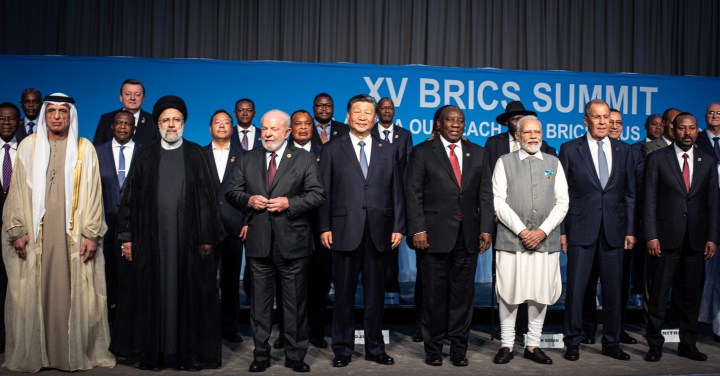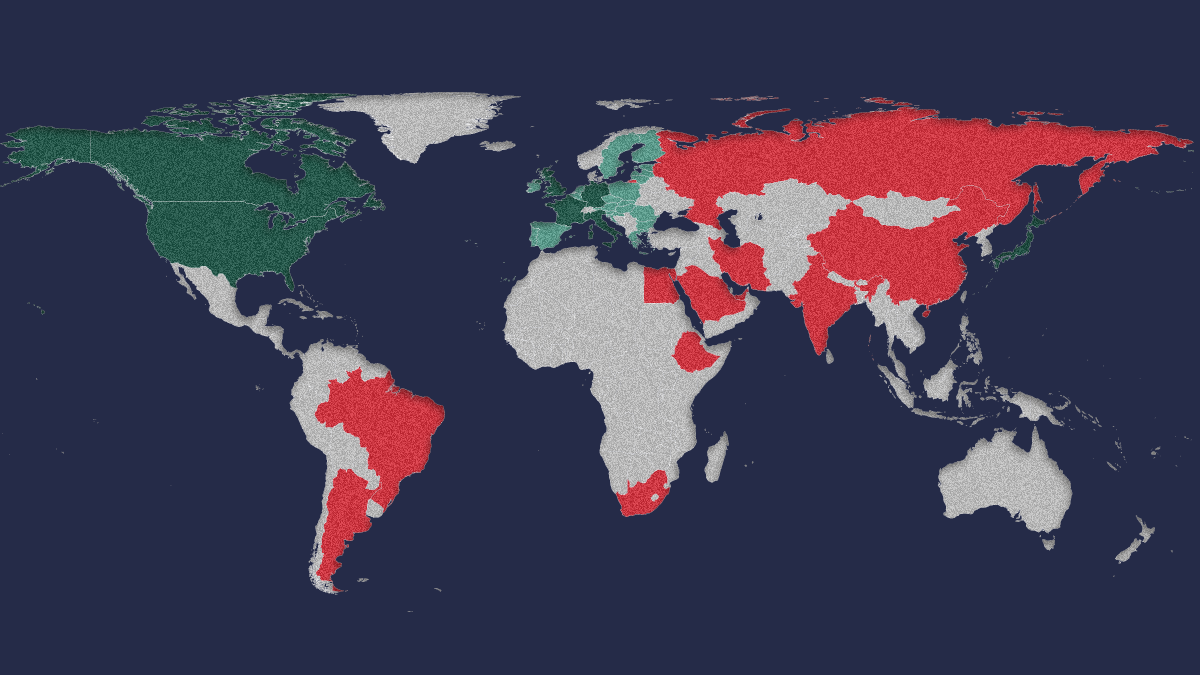ISS TODAY OP-ED
BRICS+ countries with contrasting, opposing values and political systems may see cooperation falter

Will an expanded BRICS precipitate a new international order, or collapse under the weight of its internal contradictions?
The words of 13th-century Persian poet Jalāl al-Dīn Muḥammad Rūmī, ‘As you start to walk the way, the way appears,’ certainly found new resonance in Johannesburg last week at the 15th BRICS Summit.
Read more in Daily Maverick: Key takeaways from 15th BRICS Summit – and the human rights alarm bell ringing over bloc’s new members
Apart from expanding the diplomatic club to include Iran, Argentina, Egypt, Ethiopia, Saudi Arabia and the United Arab Emirates, the summit revealed the global south’s growing disillusionment with the current structure of the international system.
These frustrations have bolstered BRICS’ appeal as a counterweight to leading Western countries, such as those composing the G7. More significantly, an expanded BRICS represents a resounding call for international reform by global south states, exclusive from, and in opposition to, traditional Western powers.
This unprecedented moment reflects the shifting locus of global power, and has propelled an expanded BRICS to chart a way into unknown territory.
Decisions over the nature and trajectory of global order were once the sole preserve of the European ‘great’ powers, along with the United States (US). The contemporary international system will undoubtedly be shaped by the Asia-Pacific region, Africa, the Middle East and Latin America.
International cooperation must evolve
If global institutions fail to evolve and accommodate this reality, international cooperation on the most pressing issues of our time will inevitably fail. On paper, this is the fundamental challenge BRICS intends to address in order to bring about a more “representative, fairer international order, [and] a reformed multilateral system”.
How it does so, however, remains poorly defined.

G7 nations are shown in green compared with BRICS+ countries denoted in red. (Graphic: Amelia Broodryk/ISS)
One likely approach is to use the group’s combined economic clout to pursue global governance, financial and justice system reform, and alternative paths on specific issues like climate change.
Already, the current BRICS states’ collective economic output (based on GDP adjusted for purchasing power parity) is roughly $3-trillion larger than the G7, which includes Canada, France, Germany, Italy, Japan, the US and United Kingdom. (As a non-enumerated member, the European Union is excluded.)
With six new BRICS members in 2024, this difference rises to just under $11-trillion. However, economic output measured by GDP based on current exchange rates places the G7 as the larger combined economy (even with the six new BRICS members).
Regardless, countries in the global south are increasingly poised to challenge the economic dominance of traditional powers. And based on the former’s current growth trajectories, will decisively outperform the G7 economies over the coming decades.
This combined economic influence could help to secure greater representation and fairer rules and procedures in the United Nations Security Council, International Criminal Court, World Bank and International Monetary Fund — among others alluded to in the BRICS Johannesburg II Declaration.
Cooperation coordination
However, coordinating common action on specific points of contention may not be as easy for the expanded BRICS grouping as for the G7.
G7 countries have structured their cooperation on global matters around shared liberal political values and norms, particularly on democracy and civil liberties. While these have been threatened in recent years by the rise of populist right-wing administrations, G7 members’ considerable normative and political alignment underpins their global economic clout.
The expanded BRICS grouping, on the other hand, is a more arbitrary constellation of states with very different (and sometimes diametrically opposed) political systems and values. They range from progressive constitutional democracies to closed and repressive theocracies, to countries experimenting with hybrid authoritarianism.
An analysis of various governance variables across member countries, including perceptions of political stability, rule of law, government effectiveness and basic freedoms, reveals a high level of variance. Scores for each of these variables show a standard deviation from the mean that is often more than double that of G7 countries.
That raises serious questions about BRICS’ ability to pursue coherent, coordinated action on global institutional reform, despite members agreeing that the international system is unfairly structured. Without a robust normative basis for cooperation, disagreements over issues such as gender equality, individual rights and liberties, and the character of a new international order, could derail momentum needed for meaningful change.
Ironically, BRICS may well be in its ascendency due to its ambiguity and loosely articulated vision of multipolarity and a reformed international system. However, as the group expands and evolves into something more concrete, difficult issues may not be as easy to kick down the road as before.
For example, how do all members justify provisions in the Johannesburg II Declaration on respecting international humanitarian law in conflict situations, increased participation of women in peace processes, and the promotion and protection of democracy, human rights and fundamental freedoms for all?
Squaring these provisions with the brazen violations by certain current and incoming BRICS members will test the mettle of the diplomatic club. These contradictions must be overcome for BRICS to muster not only its economic clout, but the moral and political capital to pursue reforms and serve as a counterweight to the G7.
Rumi’s wisdom still rings true, but as the expanded BRICS group marches towards a new world order, the way ahead may be murkier than initially expected. DM
Priyal Singh, Senior Researcher, Africa in the World, Institute for Security Studies (ISS) Pretoria.
First published by ISS Today.


















 Become an Insider
Become an Insider
well, even if these are all old men : we have diversity in head gear.
What will the new acronym be?
Anything is better than the corrupt ANC.
Therefore I’d propose that the Chinese punishment for corrupt officials (public hanging or shooting) be implimented in SA asap!
We need the SHARIA law of the Moslem countries to be installed immediately in SA to end alcohol and drug abuse and promiscuity.
And an end to racist discrimination through AA, BEE and EWC!
Bring it on BRICS +!
Shariah law isn’t just about alcohol n promiscuity etc.
Corruption is also punishable under shariah law. It addreseesbribery, corruption, extortion etc.
Apart from the social aspects, it deals extensively with economics as well.
Eg, shariah based finance makes it compulsory for financial instruments to be Asset based. So no more over burdening interest payments etc.
Every year, you are obligated to distribute 2,5% of ur wealth (mainly liquid assets, cash, gold, trading stock) to those who possess less than a defined value, currently approx R10000…
This tax applies only to Muslim citizens. Non Muslims are required to pay jizyah. Contrary to popular belief, jizyah is not a punishment tax because u are not Muslim, it is implemented because the non Muslim is not required to pay zakaat so it’s his contribution to the fiscus.
Zakaat tax prevents hoarding, n encourages spending to stimulate the economy.
Shariah business law is an entire field on its own. One example is, it is forbidden and a sin to bulk purchase items that are in short supply in order to inflate the prices. This is a punishable offense.
Google it a bit and u will be quite surprised, pleasantly surprised I hope…